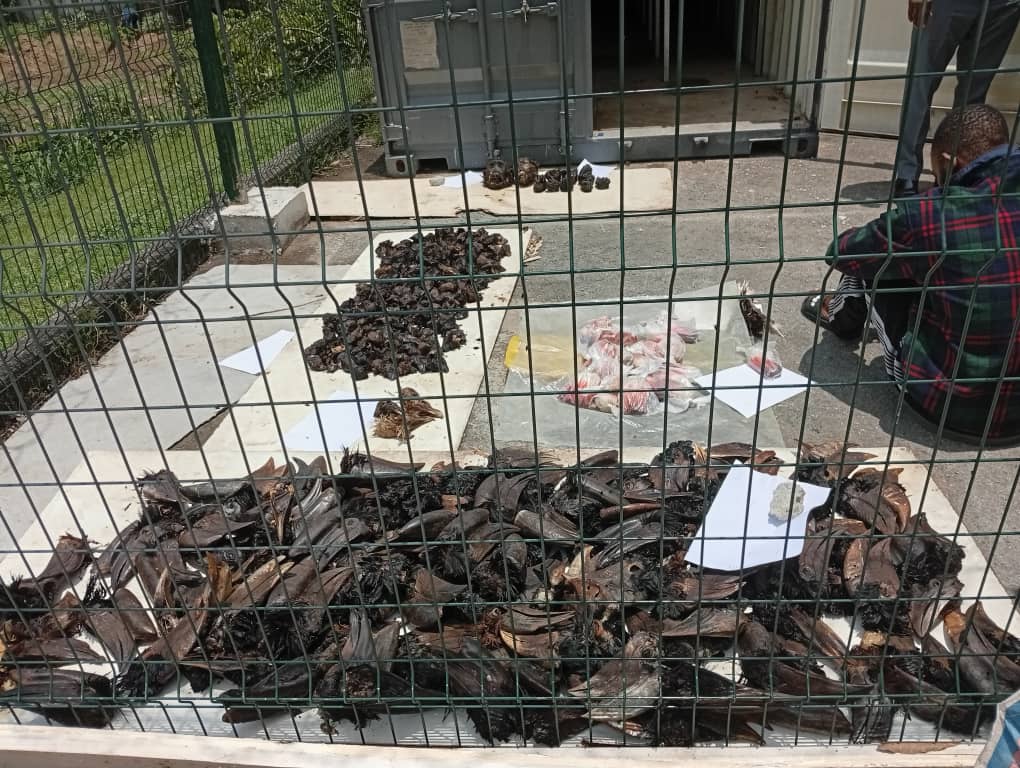It was a quiet night at the Murtala Muhammed International Airport in Lagos on July 30, 2025. But inside the cargo terminal, Nigerian customs officials were wide awake. During a routine inspection, customs officials seized a suspicious shipment from traffickers, marked “pet supplies” bound for Kuwait.
Acting on a tip, when they opened the boxes, the air rang with the shrieks of hundreds of frightened birds—over 1,600 parrots and canaries, crammed into crates, parched and stressed.
They were ring-necked parakeets and yellow-fronted canaries, both species covered by international law.
There were no papers, no permits, and no suggestion of legal origin. It was one of the biggest wildlife trafficking seizures Nigeria had seen in years. To conservationists and customs officials, it wasn’t just a seizure; it was a breakthrough.
Mark Ofua, a veterinarian and West African representative for Wild Africa, was at the site soon after the rescue. He had been sounding the alarm for years over Nigeria’s role as a transit hub in the global black market for wildlife.
From ivory to pangolin scales, animal parts and animals in general slip in and out of Nigerian borders bound for Asian markets quietly. But not this time. “This is a victory,” Ofua said, gently putting a weakened parakeet into a travel crate to be nursed back to health.
The alacrity of the customs gave hope that Nigeria’s long battle with illegal wildlife trade was beginning to turn. The birds would be turned over to the National Parks Service, where they would be cared for and eventually returned to the wild.
But this success was not built in a vacuum. It was the result of widening partnerships between government agencies and conservation organizations.
Nigeria has been tightening the noose around trafficking networks in recent years. Customs officials are also being specially trained to identify endangered species and smuggling techniques.
Workshops, typically arranged by bodies like the Nigerian Conservation Foundation, have allowed officials to more effectively interpret the legislation of the Convention on International Trade in Endangered Species of Wild Fauna and Flora (CITES).
These initiatives, backed up by Nigeria’s legal commitment to conservation, are beginning to yield dividends. Border controls are tighter, and seizures are increasingly frequent. The system, though still far from perfect, is getting better.
Alternative Livelihood
Meanwhile, in Nigeria’s rural communities and forests, another kind of war is being fought, that of awareness and alternatives. In the communities where trapping and selling wild birds used to be a way of life, residents are now being introduced to alternative livelihoods.
NGOs like Caritas Nigeria are helping locals establish ecotourism projects and engage in sustainable agriculture, turning the story from exploitation to stewardship.
At schools, wildlife conservation clubs like “Wildlife Champions” are teaching kids the importance of protecting their natural heritage. These grass-roots efforts do not make headlines like a large seizure, but they are slowly transforming the mindset that fuels the trade.
Technology is also emerging as a powerful ally. Customs authorities are beginning to utilize digital tracking systems and AI-driven cargo screening systems. Citizens are now able to report suspected wildlife movements anonymously using mobile apps.
The integration of these tools is giving enforcement agencies an edge they never had before. With each innovation, Nigeria is getting closer to a future where wildlife trafficking is not just intercepted but prevented.
The seizure of those 1,600 birds, as horrific as it was, proved to be a moment of clarity. It was a reminder to the nation that wildlife is not cargo, it’s a symbol of life, of balance, and of heritage.
And if this momentum continues, then Nigeria can still redefine its position in the world, not as a pipeline for traffickers but as a guardian of the wild.
Nigeria is making significant strides in curbing wildlife trafficking, previously notorious as a transit hub for illicit trade.
A notable success came when customs officials at Lagos’ Murtala Muhammed International Airport seized over 1,600 illegally-trafficked parrots and canaries destined for Kuwait.
The operation was a testament to strengthening partnerships between the government and conservation groups.
Efforts include specialized training for customs officials and workshops to better enforce international endangered species laws, leading to increased seizures and tighter border controls.
In rural communities, initiatives are underway to provide alternative livelihoods to reduce dependence on wildlife trade. NGOs like Caritas Nigeria introduce locals to ecotourism and sustainable agriculture, helping shift perspectives from exploitation to conservation.
Educational programs and technology, including digital tracking and AI-driven cargo screening, also bolster enforcement.
These advancements illustrate a shift from wildlife as merely an exportable commodity to a symbol of life and heritage, positioning Nigeria as a proactive guardian of its natural resources.






